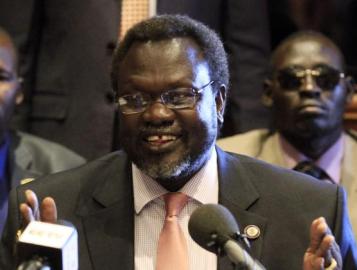South Sudan rebels deny lack of compromise in peace negotiations
October 12, 2014 (ADDIS ABABA) – A spokesperson for the leadership of South Sudan’s rebel faction the SPLM in Opposition) has dismissed government claims that the group had not been forthcoming with the necessary compromises needed to bridge the gap in the ongoing peace talks in Ethiopia.

“It is not true that we have not offered the necessary compromises in order to try to bridge the gap,” Dak told Sudan Tribune on Sunday in reaction to the claims by president Salva Kiir’s government.
Last week, information minister and spokesperson of the government Michael Makuei Lueth blamed the rebel group for stalling peace talks, saying the government had been compromising while the opposition group had not.
Lueth also said mediators of the Intergovernmental Authority on Development (IGAD) decided to adjourn the talks because of the rebels insistence that the prime minister be given executive powers as head of government, leaving the president with a ceremonial role as head of state.
He rejected the rebels’ demand, saying this would make the prime minister more powerful than the president, which was not acceptable to the government.
However, the rebel spokesperson explained that the rebel faction’s initial position on executive leadership and structure was that Kiir should step down and the country would also apply a presidential system instead of a parliamentary leadership system.
“We have compromised a lot. Our initial position was for Salva Kiir to step down as president. However, our leadership has agreed to negotiate power-sharing. We have also agreed to discuss parliamentary system,” Dak said.
Dak said the government should face the reality with the best practices of parliamentary executive systems in the world including the host country, Ethiopia.
“For instance, in Ethiopia which currently chairs IGAD and hosts the peace talks it is the prime minister who is the chief executive, the chairman of the Council of Ministers, and the Commander-in-Chief of the national armed forces,” he said.
He said the president plays ceremonial role such as receiving credentials of foreign ambassadors and special envoys, as well as awarding medals, prizes and gifts or grant pardons in accordance with the law as head of state.
IGAD last week announced it would consult with the rival principal leaders on the outstanding issues.
LEADERSHIP READY FOR CONSULTATIONS
Dak further said the leadership of the opposition faction has been ready in Addis Ababa for the said consultations with the IGAD leadership on the remaining contentious issues.
“Our chairman, Dr Riek Machar Teny, has been in Addis Ababa for the last three days in availing himself for consultations with IGAD and Salva Kiir,” he further revealed.
He said the rebel leadership is committed to reach a political settlement to end the civil war, saying the delegation had been negotiating in good faith.
Among other contentions is the fate of federalism and the integration of the rival forces during the would-be transitional period.
(ST)
